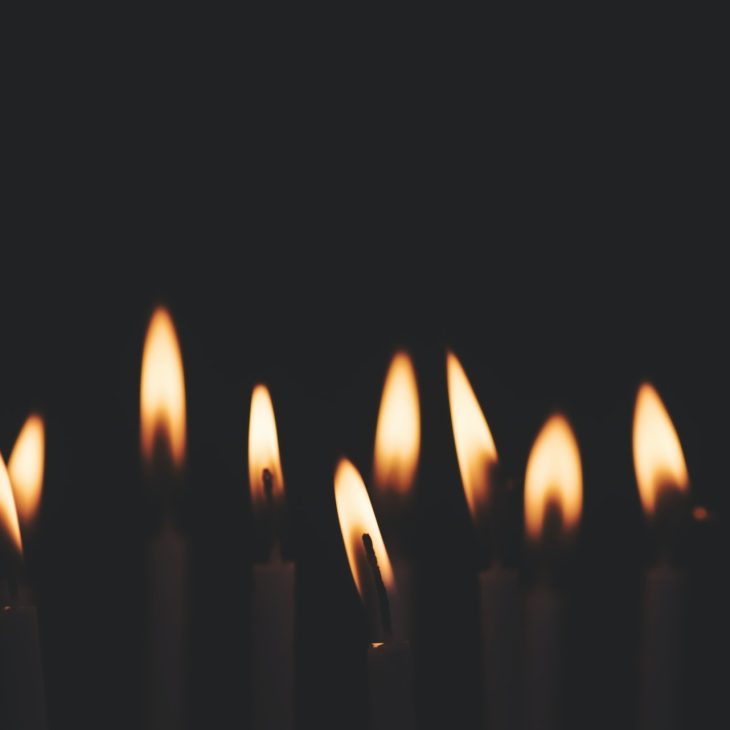Hanukkah, Culture War & the Unison of Illumination
December 9, 2020

This week, Jews all over the world will celebrate the festival of Hanukkah. For eight “crazy nights,” we will light increasing numbers of candles on a special nine-branched hanukkiah and, in North America and other parts of the world dominated by Christmas-culture, we will exchange gifts (traditionally gift-exchange occurs on the Jewish holiday of Purim, but Hanukkah’s proximity to Christmas in December led to many North American Jews switching the custom to this holiday).
The traditional story of Hanukkah that most Jews learn is that it celebrates the victory of a small but mighty group of Jews, known as the Maccabees or Hasmoneans, against the mighty Seleucid Greek Empire that controlled ancient Israel at the time (2nd century BCE) and had outlawed Jewish practice. After winning an improbable military victory, the Jews regained control of the Temple in Jerusalem only to find it defiled by the Greeks. According to the Talmud, a miracle then occurred. There was only enough oil to keep the Temple’s menorah, one of its most important ritual objects, burning for one day. But the oil miraculously stayed alight for eight days, until more kosher oil could be found/made. Hence the eight-day celebration of Hanukkah.
While this story lends itself to the kid- and the family-oriented manner in which Hanukkah is celebrated by most Jews today, many observers have pointed out that the historical story of Hanukkah – as well as how the Jewish people have interpreted it over millennia – is far more complex. For starters, the military conflict at the center of the story was not primarily a struggle between a beleaguered, religiously-persecuted minority against an evil foreign oppressor, as it is frequently framed. Rather it was more accurately a Jewish civil war between Hellenized Jews who had begun to adopt Greek customs and religious practices – and perhaps force them on their Jewish brethren – and a band of reactionary, zealous priests. As Rabbi James Ponet has argued, “Read in its historical context… the Hanukkah story is really about a revolt against the Hellenized Jews who had fallen madly in love with the sophisticated, globalizing super culture of their day. … The battle against Hellenization was in fact kulturkampf among the Jews themselves.”
Understood in this vein, the Hanukkah story presents a troubling analogy to our contemporary moment in the United States. We are undoubtedly living through a culture war of our own, although thankfully it has not turned nearly as violent as the Maccabean Revolt. We are likewise split between a cosmopolitan, outward-facing, and urban elite, and a proud, self-isolating and traditional rural populace, with elements who too readily resort to violence to resist perceived religious or political oppression. What makes this analogy particularly unsettling for the majority of American Jews – who, by and large, are more prone to urban, cosmopolitan values – is the realization that our historical counterpart in the Hanukkah story is the villainous Hellenized Jews, who were rightfully vanquished by red-blooded Maccabees wearing “Make Israel Great Again” helmets.
What lesson, then, ought we take from this story and our own part in it? Have we, in fact, been duped into celebrating a hollow victor’s justice and history? The historical analogy lends itself to a temptation to flip the story on its head; to seek to resuscitate the Hellenized Jews as the true tragic heroes, persecuted for their cosmopolitan acceptance of globalized culture.
I think not. But nor do I think we should continue to propagate the glib and vapid triumphalist version proffered in many Hebrew schools. Read in its full context, the Hanukkah story contains far greater power and insight than such a simple right vs. wrong narrative in either direction. At its core, Hanukkah asks us to reflect on what it means both to be part of a tradition and to participate in a diverse society; to cherish and nurture time-honored rituals and to be open and receptive to new and foreign ideas; to proudly claim one’s own identity and to be enchanted by the exquisite beauty of another. And crucially, the narrative seems to suggest that there are profound dangers in straying too far in either direction.
As much as we might identify with their global sensibilities, the Hellenized Jews took things to extremes. The Apocryphal (literally) first Book of the Maccabees recounts that some Jews went so far as having themselves uncircumcised in order to attend Greek gymnasia, and sacrificed pigs at the Temple. Conversely, for all their fundamentalist piety and military prowess, the Hasmonean state the Maccabees established eventually declined into petty tyranny as well. Three centuries later, the memory of the Maccabean fervor inspired the Jewish Zealots’ failed rebellion against Rome that led to the destruction of the Second Temple and Jews’ exile from their historical homeland.
The moral then, as it is now, is to resist the temptation of triumphalism. Culture war is, perhaps, inevitable. It’s no easy feat balancing tradition and discovery, isolation and hospitality, identity and diversity. But when we win narrow victories – be they supreme court justices or elections – over our fellow citizens, we must not impose a victor’s justice, neither by law nor by the sword. As we recount the Hanukkah story during this period of political transition, all of us as Americans should reflect that the real miracle of Hanukkah has nothing to do with battles fought and won or oil outlasting its shelf life, but rather that we are simultaneously many and one, divided yet interdependent. As Rabbi Ponet observes, when Jews light the hanukkiah, we light each candle separately, yet when we stand back there is simply the “unison of illumination.”
Share
Related Articles



